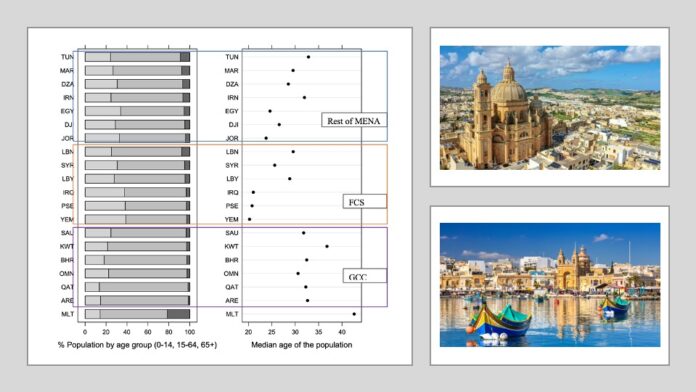Malta is a small European island in the Mediterranean Sea that shares many cultural norms with the Middle East and North Africa Region. For Malta, like the MENA region, family is very important, and older people are respected and valued by society. Caring for older people is seen as a family business, and daughters usually do the majority of caring if their parents start to have health and social needs. However, similar to the MENA region, socio-demographic changes and trends in migration, female labour participation and other factors are influencing the availability of families to continue to provide long-term care.
Unlike the MENA region, however, Malta completed its demographic transition in 2006 when at least 14 per cent of the population was aged 65 years or more. Malta took a total of 49 years to transition from an ageing to an aged population, starting this process back in 1957. Life expectancies at all ages have been improving steadily in Malta. For example, in 2020, on average, an individual aged 60 years was expected to live an additional 24 years.
The combination of social and demographic changes observed in Malta necessitated the development of long-term care markets and services. Particularly, in recent years, Malta has been investing in culturally-sensitive and person-centred residential care. MENARAH had the opportunity to visit one of the recently developed care homes, Golden Care Home, and speak with its CEO, Ms Jackie Camilleri. Ms Camilleri explained the changes that are taking place in Maltese society and the changing demographics. She talked about the funding arrangements and the role of the states and families in providing long-term care in Malta. She also took us on a tour of the care home she managed to explain the importance of creating a sense of being at home and respecting the wishes and preferences of older people while ensuring an excellent level of medical and social support.
There are several learning points that the MENA region can take from the experience of Malta when it comes to developing long-term care services. Some of these include:
1- Designing services in a culturally sensitive manner.
2- Having a strong partnership between the state and the providers of services.
3- Setting clear standards and regulatory mechanisms for services.
4- Developing mechanisms to raise funding that is specific to financing long-term care services.
5- Building capacity of the care workforce, including ensuring adequate training programmes and career development opportunities.
Listen to Ms Camilleri full interview here.
Founder and Director
Shereen Hussein is a Health and Social Care Policy professor at the London School of Hygiene and Tropical Medicine (LSHTM), United Kingdom.
Shereen Founded the MENARAH Network in 2019, through an initial grant from the Global Challenge Research Fund, UKRI. She is a medical demographer with expertise in ageing, family dynamics, migration and long-term care systems. Shereen regularly collaborates with the United Nations, the World Health Organisation and the World Bank in policy and research focused on ageing in the Middle East and North Africa Region.
Shereen received her undergraduate degree in statistics and a postgraduate degree in computer science at Cairo University. She completed an MSc in medical demography at the London School of Hygiene and a PhD in quantitative demography and population studies at the London School of Economics and Political Science, United Kingdom.



